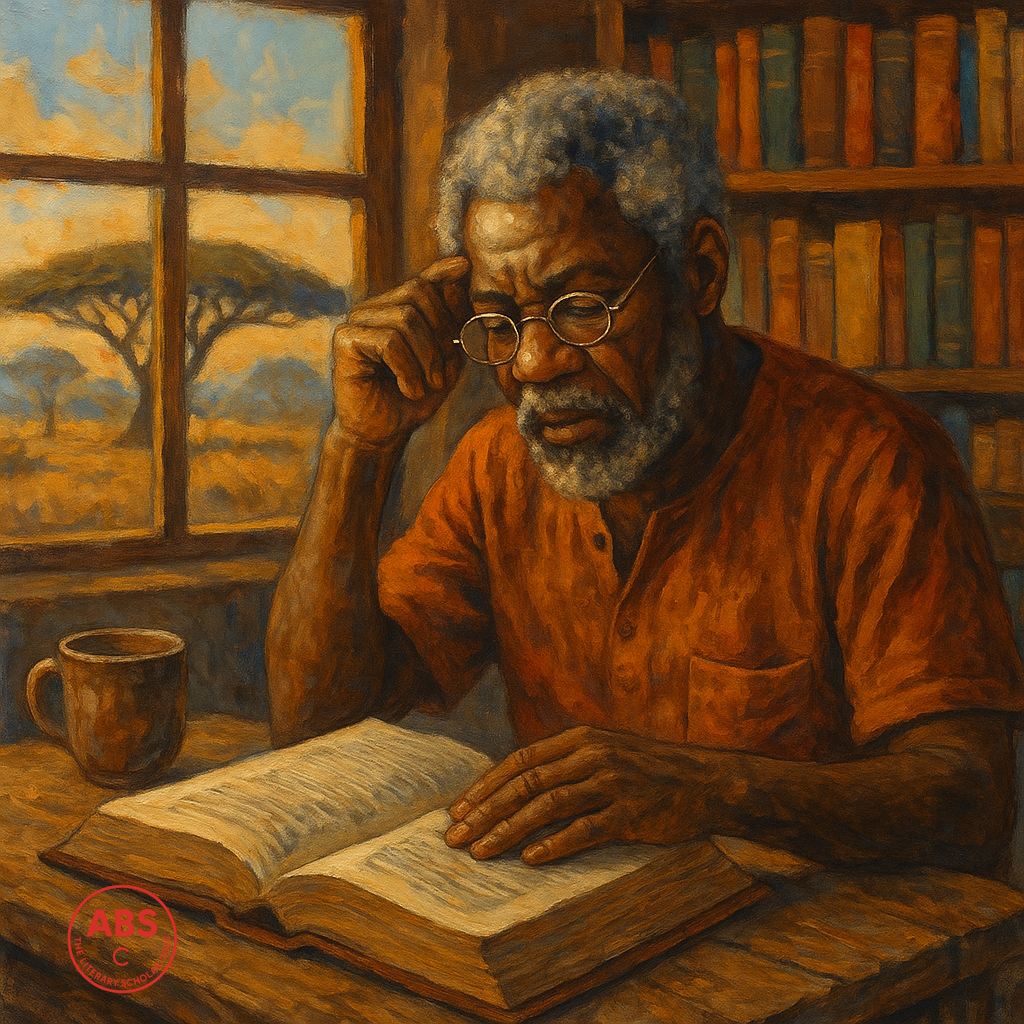Myth, Magic, and Modern Mess in African Storytelling from Oral Epics to Bureaucratic Nightmares
From ABS, Who Believes folktales are more truthful than most press briefings.
Before the printing press or publishing deals, before the empire’s map crayons coloured entire continents beige, Africa had its own Wi-Fi network: the griot.
A walking library. A melodic historian. A sarcastic soul with a memory that shamed Google. The griot didn’t just recite stories—they transmitted cultures, corrected kings, and occasionally gossiped with divine authority. That’s how African literature began—not on paper, but in performance.
So when colonial officials later complained that Africans had “no literature,” the griots must’ve been somewhere in the background, snorting into their balafons.
Griots, Guardians, and the Original Fact-Checkers
From the Mandé epics of Mali to the Yoruba myths of Nigeria, oral literature wasn’t “primitive.” It was poetic, prophetic, and often political.
Take Sundiata: An Epic of Old Mali, passed down orally for centuries before being transcribed. The tale isn’t just about a hero who couldn’t walk as a child but eventually became emperor—it’s about the nature of destiny, exile, and leadership. And yes, there are magical buffalos, jealous stepmothers, and some top-tier revenge planning.
Griots were not neutral narrators. They threw in commentary, judgment, and the occasional insult. If you disappointed the community, your story might survive—but you wouldn’t come out looking good.
They were the original story-spinners and shade-throwers.
Mythic Frameworks and Literary Firestarters
As African literature entered the written form, these mythic frameworks didn’t disappear. They adapted.
Enter Ben Okri, whose The Famished Road (1991) won the Booker Prize and confused every reader who thought “realism” meant IKEA furniture and relationship trauma. Okri introduced Azaro, a spirit-child navigating a Nigerian ghetto haunted equally by spirits and political thuggery.
It’s magic realism—but African. Not the Latin American imitation. In Okri’s hands, mythology wasn’t decorative—it was diagnostic. Spirits didn’t just haunt; they symbolized trauma, transition, and sometimes, election fraud.
Similarly, Amos Tutuola’s The Palm-Wine Drinkard (1952) baffled British critics who didn’t know what to do with its surreal, folklore-laced narrative. The prose was broken, the plot delirious—but it was authentic. Tutuola didn’t write for colonial approval. He wrote for those who knew that palm wine was better than Western tea—and ten times more dangerous.
The Government Agent Arrives
African writers had barely caught their breath from the collapse of colonialism when bureaucracy and postcolonial chaos showed up. If colonialism was a fire, independence was sometimes a frying pan.
Enter satire.
Ayi Kwei Armah gave us The Beautyful Ones Are Not Yet Born, where rot seeps from every political promise.
Mongo Beti created characters trying to make sense of a modern Africa still shackled by old structures.
Wole Soyinka, never one to pull punches, delivered A Play of Giants, where dictators strut on stage, wearing borrowed power and broken morals.
Tewodros Fekadu and Ngũgĩ wa Mirii dramatized the absurdity of newly independent governments trying to erase colonialism while emulating it.
These weren’t stories of triumph. They were farces, painted in irony. Think Kafka, but with more mosquitoes and better metaphors.
Between Spirits and States: The Hybrid Genre of Survival
African literature, unlike its more self-serious European counterparts, knew that a story could be both sacred and satirical. That gods and idiots often shared the same space. That the president and the trickster spirit were sometimes indistinguishable.
From Zakes Mda in South Africa to Tayeb Salih in Sudan (Season of Migration to the North), authors twisted traditional storytelling into hybrid literary forms. Dreams became documents. Rituals became resistance.
This fusion wasn’t just aesthetic—it was strategic. In places where speaking truth could land you in jail, allegory was armor. And tricksters became truth-tellers.
The Power of the Trickster and the Satirist
African literature has always loved the trickster—whether it’s Anansi the Spider, Eshu the Yoruba god of mischief, or a banana republic leader on state TV declaring the economy “thriving.”
Writers embraced the trickster as the only figure agile enough to navigate contradictions. In Ngũgĩ wa Thiong’o’s Devil on the Cross, the devil himself crashes a capitalist conference. In Soyinka’s The Road, a madman talks more sense than the bureaucrats.
And in today’s digital landscape? The griot has evolved. Now they use Twitter threads, podcasts, and spoken word slams—but the role is the same: speak, remember, subvert.
We Were Always Writing—You Just Weren’t Reading
The greatest lie colonialism told was that it gave Africa literature. What it gave, at best, was binding and ISBN numbers. The stories were always there—epic, elegant, and unapologetically layered.
African literature doesn’t separate myth from reality, or story from state. It threads the sacred into the silly, the political into the poetic. In the same breath, it praises a deity, mocks a minister, and blesses a child.
So if it feels like too much? That’s because it’s life—told by those who know it best.
ABS folds the scroll beneath a tree where a griot once sang and a politician now stammers.
The drumbeat of stories echoes between gods and governments, neither of whom can quite control it.
Somewhere in the dust and laughter, a new myth is being born—already rehearsing its punchline.
Signed,
ABS
The Literary Scholar who believes stories don’t need approval—they just need rhythm.
And sometimes, a really well-placed metaphor can overthrow a regime.

Share this post / Spread the witty word / Let the echo wander / Bookmark the brilliance
